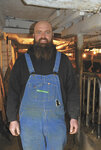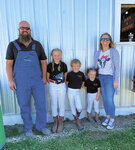ELMWOOD, Wis. – When Tom Knegendorf learned how to breed cows as a high school student, he did not intend to make it a full-time career. Years later, he is balancing a full breeding route with taking over his father’s farm.
“Full Throttle Genetics encompasses the dairy and the A.I. business,” Knegendorf said. “That’s probably the only reason we’re still here.”
Knegendorf and his father, Albert, milk 50 cows in a tiestall barn in Pierce County near Elmwood. They have been working through a transition for six years.
With a fresh dairy science degree to his name, Knegendorf and his wife, Katie, originally planned to rent a barn and milk on their own in 2008. When he saw the district manager of a reproductive company at an event, Knegendorf mentioned he was able to breed cows.
“I said I was kind of looking for relief work,” Knegendorf said. “I thought I could milk cows and breed on the side to kind of help fund things.”
The manager pointed said there was not a representative in his area and suggested Knegendorf could have his own territory. Knegendorf consulted with his dad who offered him an opportunity to come home to milk cows.
“Dad said I could come back and do half the milking and breed cows,” Knegendorf said. “I thought that sounded more profitable than milking on my own.”
Thus, the transition began.
In the beginning, Knegendorf milked mornings and every other weekend, and Knegendorf began the process of building up a breeding business. Albert milked evenings and every other weekend.
“The territory had zero cows,” Knegendorf said. “We had nothing to start the business with, but I had a great manager. And, we started doing cold calls and beating on doors.”
His local reputation allowed him to get into a few barns, and the business felt its first growth when another representative let some of his territory go to Knegendorf.
“I started working for ABS in June 2008,” Knegendorf said. “We bred our first cow in July of 2008. We picked up a little more business, and it just kind of kept growing.”
Knegendorf continued to milk in the mornings before going on the breeding route and had part-time help for milking in the evenings and on weekends. It was all working toward ownership of the dairy.
“As we got closer to buying the cows, we realized that the cash flow part of the A.I. business just made things easier,” Knegendorf said. “When the price of milk is $14, we are still pounding the road breeding cows. Because we put both businesses under the same LLC, they work together.”
When the time came to buy the cows, Knegendorf went into it with around 35 head of his own and bought the rest of his dad’s milking cows. In order to ease Albert out of getting a milk check, Knegendorf bought the springing heifers as they calved. At the same time, Knegendorf purchased the vacuum pump, milk tank, mixer wagon and feed cart.
“I bought the things I needed to feed the cows but none of the machinery because I didn’t own any of the land,” Knegendorf said. “With that, I buy all my feed from my dad.”
Albert owns all the equipment and the land, and also raises 50 steers every year.
“All the feed gets weighed through the (mixer) so you know how much you’re buying,” Knegendorf said. “I paid for my forage by the ton from him, and I bought my corn by the ton from him. I paid for my protein because that was an off-farm product.”
A couple years into the transition, someone approached Knegendorf about renting 50 acres close by. Knegendorf took on that expense and has since planted corn on corn, accounting for most of the shell corn he needs for the year.
Once Albert was no longer receiving a milk check over the course of a couple years, they devised a system to work for everyone. Albert works for the farm as an employee and records his hours. He does most of the feeding, general chores and has full management of the calves. Albert also provides feed to Knegendorf.
“I don’t know that it was a tough decision to do it that way, but it keeps everything black and white,” Knegendorf said. “He gets his hours, plus income from feed and still raises his steers. It sure eliminates a lot of conflict for working together.”
They do have a part-time employee who feeds on the weekends, allowing Albert time off. There is also a herdsman to milk at night while Knegendorf is breeding cows.
Knegendorf’s breeding route consists of five big stops with 400 to 1,400 cows. He has 16 active clients and in January had a record day of breeding 169 cows. On an average day, Knegendorf breeds around 20 cows and on a busy day will breed about 85 cows.
Knegendorf said he enjoys working as an independent A.I. representative. They provide support, technical services and access to relief breeders which allows Knegendorf to take off one day a week and one weekend a month.
“We always said when we buy the cows then we’re not going to breed cows anymore,” Knegendorf said. “But that didn’t happen. When the milk price is lean, the A.I. business is consistent.”


Comments
No comments on this item Please log in to comment by clicking here